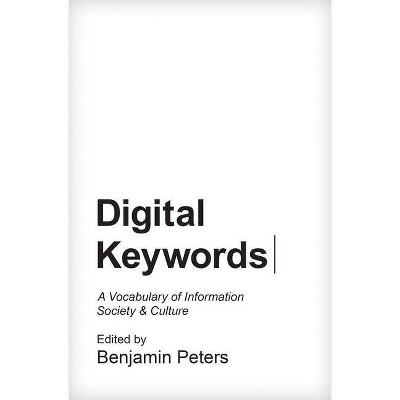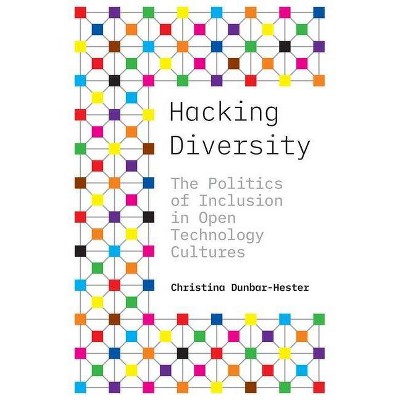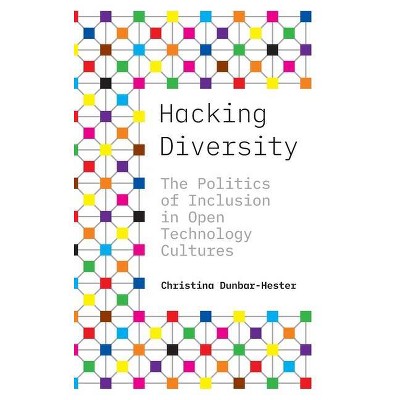Digital Keywords - (Princeton Studies in Culture and Technology) by Benjamin Peters (Paperback)

Similar Products
Products of same category from the store
AllProduct info
<p/><br></br><p><b> Book Synopsis </b></p></br></br><p><b>How the digital revolution has shaped our language</b> <p/>In the age of search, keywords increasingly organize research, teaching, and even thought itself. Inspired by Raymond Williams's 1976 classic <i>Keywords</i>, the timely collection <i>Digital Keywords</i> gathers pointed, provocative short essays on more than two dozen keywords by leading and rising digital media scholars from the areas of anthropology, digital humanities, history, political science, philosophy, religious studies, rhetoric, science and technology studies, and sociology. <i>Digital Keywords</i> examines and critiques the rich lexicon animating the emerging field of digital studies. <p/>This collection broadens our understanding of how we talk about the modern world, particularly of the vocabulary at work in information technologies. Contributors scrutinize each keyword independently: for example, the recent pairing of <i>digital</i> and <i>analog</i> is separated, while classic terms such as <i>community</i>, <i>culture</i>, <i>event</i>, <i>memory</i>, and <i>democracy</i> are treated in light of their historical and intellectual importance. Metaphors of the<i> cloud</i> in cloud computing and the<i> mirror</i> in data mirroring combine with recent and radical uses of terms such as <i>information</i>, <i>sharing</i>, <i>gaming</i>, <i>algorithm</i>, and <i>internet</i> to reveal previously hidden insights into contemporary life. Bookended by a critical introduction and a list of over two hundred other digital keywords, these essays provide concise, compelling arguments about our current mediated condition. <p/><i>Digital Keywords</i> delves into what language does in today's information revolution and why it matters.</p><p/><br></br><p><b> From the Back Cover </b></p></br></br><p>"<i>Digital Keywords</i> interrogates some of the words at the center of our socio-technical world, revealing the way in which the digital has reconfigured culture. This inspiring book is essential for all who are trying to understand our contemporary mediated society. It's a pure delight for anyone who hasn't stopped to think about the power of these words."<b>--danah boyd, founder of Data & Society and author of <i>It's Complicated: The Social Lives of Networked Teens</i></b></p><p>"<i>Digital Keywords</i> is fascinating, erudite, informative, and delightful. This is a cabinet of present-day wonders to which I'm sure I'll return many times."<b>--Todd Gitlin, Columbia University</b></p><p>"The distinguished contributors of <i>Digital Keywords</i> analyze the ways language has changed as a result of the digital revolution. The result is an engaging and readable tour through important concepts in scholarly debate and public discourse."<b>--Daniel Kreiss, University of North Carolina, Chapel Hill</b></p><p/><br></br><p><b> Review Quotes </b></p></br></br><br>[A] new and revolutionary publication. . . . <i>Digital Keywords</i> serves as an in-depth interrogation of the meaning and development of digitised language. . . . Those wishing to gain a deeper understanding of the modern, digital world we all inhabit would be well advised to begin by taking a look at this book. Just as <i>Keywords</i> made its way firmly onto reference shelves in the 1970s, so too will <i>Digital Keywords</i> today.<b>---Jade Fell, <i>Engineering and Technology</i></b><br><br>Finalist for the 2017 Susanne K. Langer Award for Outstanding Scholarship in the Ecology of Symbolic Form, Media Ecology Association<br><br>This a good springboard to spark a discussion about the cultural and social significance of a select set of words in the context of a computer-mediated society and culture.-- "Choice"<br><p/><br></br><p><b> About the Author </b></p></br></br><b>Benjamin Peters</b> is assistant professor of communication at the University of Tulsa and affiliated faculty at the Information Society Project at Yale Law School.
Price History
Price Archive shows prices from various stores, lets you see history and find the cheapest. There is no actual sale on the website. For all support, inquiry and suggestion messagescommunication@pricearchive.us




















